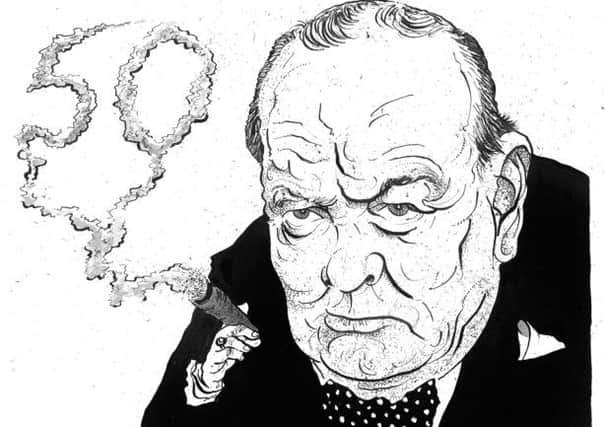Bernard Ingham: The day I met Churchill


The chubby old chap passed us by from our vantage point on the walls of the Remembrance Gardens next to the Picture House. I have no recollection of his giving us the V-sign (V for victory, that is).
Perhaps deep down he knew that, however grateful the nation was for his wartime leadership, Clement Attlee’s Labour were heading for a landslide victory and the social reform of Britain.
Advertisement
Hide AdAdvertisement
Hide AdWhat I do know is that we Young Socialists were restrained in his presence. We might have booed any other Tory. Instead, we were in awe of him, as I recall, and afterwards thrilled to bits we had actually seen in the flesh the chap who said we would, if necessary, fight them in the hills.
I used to have this vision of Churchill, the guerrilla leader, directing us in the war against a Nazi occupation from Wuthering Heights.
I mention all this because 50 years come Saturday he died at the age of 90. In those 50 years, we have seen the greatest and most rapid advance in man’s history in spite of his innate belligerence and brutality. Those years have also emphasised the continuing need for steadfast leadership in peace of the kind that Churchill brought in opposing Nazi appeasement and inspiring defiance of Hitler’s evil in the 1940s.
I think history teaches us that but for Churchill we, like the rest of Western Europe, would, for all our fortitude, have become a subject people. We – indeed Europe – owe our democracy to one man whose recklessness in learning to fly and on the battlefield, whether up the Khyber or in the Sudan or South Africa, and his disconcerting lust, even as Prime Minister, to be where the action was would have long done for one whose life was less charmed.
Advertisement
Hide AdAdvertisement
Hide AdThis is not to mention his appetite for Champagne, cigars, late nights and endless work, whether pestering the government machine for action, dictating speeches or writing his way to the Nobel Prize for Literature.
The political genius of this polymath came with a steel-reinforced constitution. Margaret Thatcher’s was mere iron in comparison.
Yet even Churchill became Prime Minister against the odds. Here was a man who had not merely ratted but re-ratted, leaving the Conservatives for the Liberals only to return.
Moreover, he had some serious black marks against him – notably the 1914 failed defence of Antwerp, the Dardanelles disaster and the late 1920s return, perhaps against his inclination, to the gold standard.
Advertisement
Hide AdAdvertisement
Hide AdHe was seen as a warmonger and adventurer with dubious judgment. Boris Johnson, in his recent book on Churchill, shows there was anything but a Tory welcome on the mat for him when he succeeded Neville Chamberlain in 1940.
Like Johnson, he was also an egotist, a gifted publicist in pursuit of his latest purpose, ambitious and rumbustious with it. He made waves.
He also had a sense of humour. His reaction, according to his grandson Nicholas Soames, to the Chief Whip informing him that a Minister caught seducing a Guardsman had to go, is hilarious. “A Guardsman?” he asked. “On a park bench? At 3am? In February? In this weather? My God, it makes you proud to be British.”
Above all, he deserved to be lucky. And he was. No one will know precisely why Hitler held back General Guderian’s tanks when he could have swept us into the sea at Dunkirk.
Advertisement
Hide AdAdvertisement
Hide AdOur luck – indeed, the world’s – was to have him at the helm from 1940-45.
It was a bit late to judge the compleat war leader as a peacetime Prime Minister in the first half of the 1950s. By then he was a spent force. But I doubt whether he was cut out for government in ordinary times. This compassionate, romantic man had all the defects of aristocratic politicians: he was, for example, soppy about the working man.
It is also perhaps not as easy to lead lackadaisical Britons in peace as in war. But led they have to be. In war he always led from the front. That is why – modern politicians facing Vladimir Putin and murderously militant Islam, please note – I remember “meeting” him 70 years ago as if it were only yesterday. A state funeral acknowledged his exceptional worth.